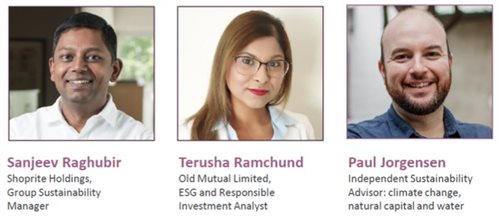
Top stories




Marketing & MediaWarner Bros. was “nice to have” but not at any price, says Netflix
Karabo Ledwaba 1 day


More news

Logistics & Transport
Maersk reroutes sailings around Africa amid Red Sea constraints
















Around 40% of 177 directors surveyed by the Institute of Directors South Africa (IoDSA) this year cannot comfortably explain the causes of global warming, while 80% cannot explain the difference between a 1.5 °C, 2 °C or 4 °C scenario. In addition, 34% do not currently have an approach to building capacity and competence on climate-related issues, and only 8% of directors are using the Task Force on Climate-Related Financial Disclosures (TCFD) Framework. Less than 8% of directors were aware of South Africa’s Green Finance Taxonomy, which is currently being developed by National Treasury with support from the International Finance Corporation, the National Business Initiative and the Carbon Trust.
These alarming findings were shared during the first webinar in a series devoted to empowering South African directors to make informed decisions about climate-related issues, which was by Trialogue in association with the Sustainability Institute (SI) and IoDSA on 26 October. The webinar explored key topics around the science of climate change, director-level awareness relating to the topic, and business views on the latest developments in new codes, standards and frameworks that have emerged in response to climate change.
The webinar was held ahead of the United Nations Climate Change Conference (COP26), which is currently being held from 1-12 November in Glasgow, Scotland, where decisions will be taken that will have a direct impact on South African businesses.
According to Dr Jess Schulschenk, director of the Sustainability Institute and one of the panelists taking part in the webinar, the world needs to halve global emissions by 2030 and reach a net zero target by 2050 to stay within a 1.5 °C warming scenario. Explaining the science behind climate change, Schulshenk drew attention to the World Economic Forum’s 2021 Global Risks Report (see illustration from the report below), which points to the interconnectedness of climate change to other key risks. “We see that climate action failure is deeply connected and reinforces a number of global risks, many of which we see unfolding in the African context,” she explained, adding that this is a social justice issue because those most affected by global warming are people who have barely contributed to it.
There is a need for capacity development among business leaders to mitigate these climate-related risks, according to Trialogue senior associate consultant Nicole Martens, who indicated that South Africa is at risk of doing the bare minimum while failing to invest in capacity to do more. Company directors are therefore urged to understand the risks and assess the potential impact on their operations.
Climate change is a systemic risk for the financial sector, explained Old Mutual Limited ESG and responsible investment analyst Terusha Ramchund. “It’s no longer just the heavy emitters that are responsible, but also the fiduciaries of capital having significant influence over the deployment of funds,” she said. “Looking across from a strategic, financial, as well as operational risk perspective, it is definitely something that needs to be integrated into the way in which we do business.”
Shoprite Holdings group sustainability manager Sanjeev Raghubir pointed out that heavy rainfall in Mpumalanga and drought in the Eastern and Western Cape have affected the supply and availability of some produce, like tomatoes, pushing up prices. Low income communities are set to face the biggest impact of climate change, with many of Shoprite’s customers, suppliers and employees living in these areas. Raghubir said communities are already receiving support through food garden programmes and mobile soup kitchens, which Shoprite deploys in the event of any climate emergency or disaster. The retailer has committed to a 1.5 °C trajectory and net zero carbon emissions by 2050, said Raghubir. This includes a 50% reduction in greenhouse gases by 2030.

Independent sustainability advisor Paul Jorgensen, who focuses on climate change and natural capital strategy, said keeping up with climate news, policies, pledges, commitments, frameworks and tools can be overwhelming, but the approach to identify and manage these risks does not need to be complex. “That’s where TCFD really provides a helpful process to just begin,” he said, noting that it is an iterative process. “We need to make a start; we need to move to a low carbon economy, and we need to understand the risks and opportunities in doing so.”
Raghubir pointed out that science, debates, predictions and components of climate change are very complex and potentially discouraging for new entrants to engage with. “It may be better to look across the value chain of your business with a climate change lens on to identify business impacts and opportunities, and address these. The layers of governance, strategy and metrics can be added thereafter,” he said. “Take the complexity out and be more action orientated.”
Watch a recording of the webinar here https://youtu.be/HZhRJYzuML4
How to keep up to date with COP26:
Climate change series:
The following four videos are part of a four-part series on Climate Risk and Climate Oversight for South, produced by the IoDSA in partnership with the Embedding Project.
Tools and frameworks to get your started on your TCFD journey:
Trialogue is a niche corporate responsibility consultancy that provides thought leadership and support to clients in the sustainability and corporate social investment (CSI) arenas, through publications, a knowledge hub, conferences and webinars, as well as advisory services in CSI, integrated thinking, monitoring and evaluation and client reporting. For more information, visit www.trialogue.co.za.